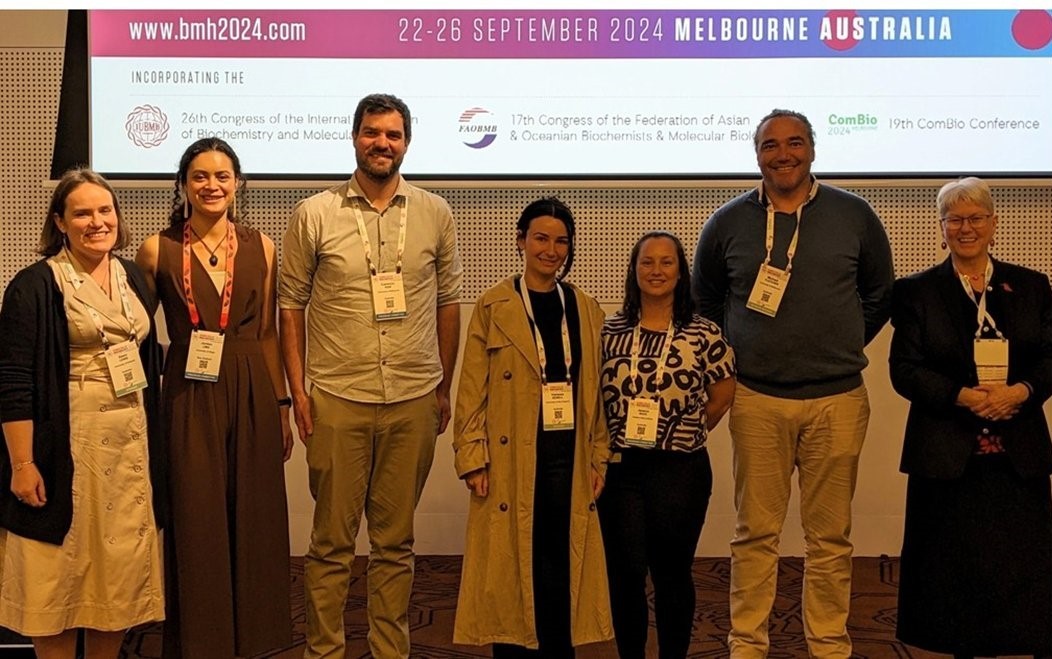
Dr Jessica Buck, a researcher at The Kids Research Institute Australia Cancer Centre and a Kamilaroi woman, is on a mission to address the unique challenges faced by Aboriginal and Torres Strait Islander children with cancer.
Last week, she attended the Biomolecular Horizons 2024 conference in Melbourne as an invited speaker and co-chair of multiple panels where she brought awareness about Indigenous health to a global audience. The conference was host to not one, but two Nobel prize winning speakers, along with delegates from 44 different countries.
Indigenous children with cancer in Australia experience worse outcomes than other Australian children, but the reasons behind this disparity remain unclear.
“Historically, there’s been very little research focused on Indigenous kids with cancer,” Dr Buck said.
“My research aims to uncover the underlying factors that may be influencing these outcomes and to find ways to improve them.”
Drawing on emerging studies in adult Aboriginal and Torres Strait Islander populations, Dr Buck is beginning to explore whether the molecular subtypes of cancer — variations in the genetic makeup of the disease — are also different in Indigenous children. Her goal is to determine if these subtypes contribute to poorer cancer outcomes, as seen in Indigenous adults, and use this knowledge to develop more targeted treatments.
During her presentation at Biomolecular Horizons, Dr Buck highlighted the untapped potential of biomolecular science to improve cancer outcomes for Indigenous children. She also co-chaired two sessions: one panel discussion on the ethics and applications of molecular biology in Indigenous contexts, and another on Indigenous perspectives on health. In addition to these roles, she coordinated the Conference’s Indigenous Perspectives stream alongside Jordon Lima and Dr Cameron Raw.
A major takeaway? The urgent need for Aboriginal, Torres Strait Islander, and Māori reference genomes to ensure cancer-specific gene variations can be correctly interpreted, rather than misclassified as variants of unknown significance due to a lack of data from these populations.
“Most of the world’s genomic studies are carried out in European people. When we see variations in genes that are uncommon in European populations, it is difficult to tell whether this is part of normal variation within an Indigenous population or might be a variation that is important to cancer, or other conditions,” Dr Buck said.
Just as we now recognise that past studies focusing solely on males resulted in medicines that don’t work or are even harmful to women, Dr Buck emphasises that it’s essential for precision medicine to avoid contributing to further inequity for Indigenous populations.
“Indigenous health research is not just the domain of Indigenous researchers. It’s the responsibility of all scientists to contribute to research that benefits Indigenous people,” she said.
This sentiment was echoed throughout the conference, where discussions focused on fostering greater inclusion of Indigenous researchers and ensuring clinical trials are designed to be equitable and inclusive.
Dr Buck’s work is helping pave the way for future breakthroughs in cancer treatment for Indigenous children.
“We aim to understand the biological, social, and cultural factors contributing to poor outcomes for Indigenous kids and to come up with solutions that will close the gap.”
Through her research and advocacy, Dr Buck is shaping the future of cancer research, ensuring that the voices and needs of Indigenous communities are heard, represented, and addressed.
